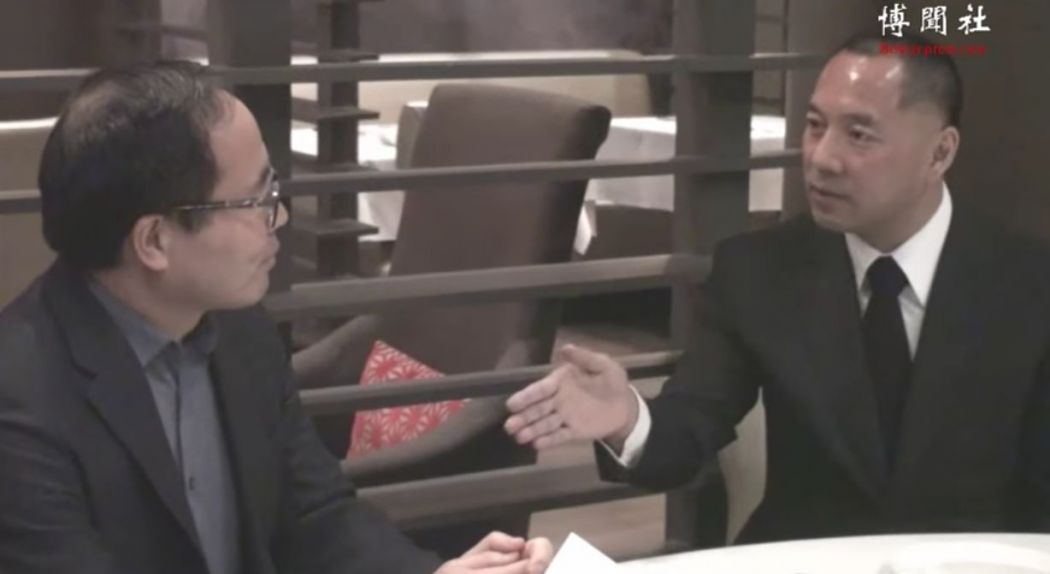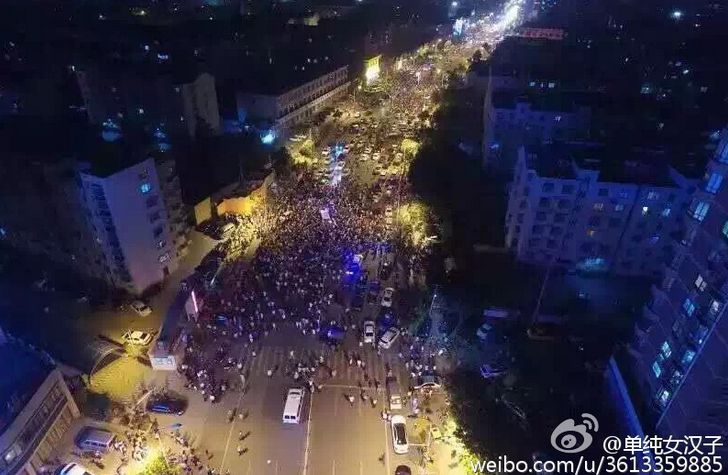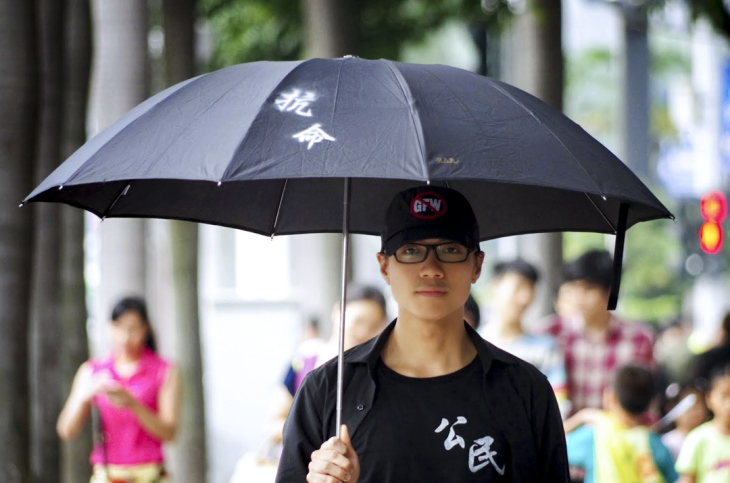64 Tianwang is a website dedicated to documenting human rights violations in China. It was widely believed to be the first of its kind in the country, and – 18 years ago – its founder believed it would eventually be on par with outlets like the Washington Post, the Associated Press, and CNN.
Since then, Huang Qi has served two prison terms for his work on the site. The 54-year-old was detained for the third time on November 28, 2016, after police raided his flat in Chengdu. Weeks earlier, the Sichuan activist had told HKFP that he remained optimistic about the future of his project despite the imprisonment of many of its citizen journalists. He said that suppression was a “necessary condition” to help 64 Tianwang grow and perfect its work.

Huang was just one of many key figures behind such websites who have recently been put behind bars. Over the past two years, the authorities have detained Zhen Jianghua, the key organiser behind information and advocacy site Human Rights Campaign in China, Liu Feiyue, the founder of the Civil Rights and Livelihood Watch website, protest bloggers Lu Yuyu and Li Tingyu. Besides these key operators, colleagues of Huang and Liu have also been detained.
Before Xi Jinping took power, there was a network of netizens spreading information about their cases online, human rights lawyers helping them with their cases, mass media, big Vs (influential figures on social media) and rights platforms – all working together as part of an ecosystem.
One by one, the government tightened its grip on the pillars which held up the ecosystem. Now, the networks no longer function together as they once did.
Citizen-run platforms aggregated human rights-related information from across the country and provided an online space for dissidents to discuss their political views and exchange information in a climate of increasing government control over the media and the internet.
With headlines such as “Over 1,000 petitioners gather at Public Security Bureau” and “Villagers injured in land grab,” and “Activist taken away in police summons,” the websites gave voice to some of the most vulnerable people in society who often had few avenues of recourse when their rights were infringed.

Huang stands charged with “illegally providing state secrets to foreign entities.” Zhen and Liu are suspected of “inciting subversion of state power,” while Lu was sentenced to four years imprisonment for “picking quarrels and provoking trouble,” and Li was reportedly secretly tried for the same crime. Each of the charges are commonly used by the state to silence dissidents.
All of the websites examined by HKFP appear to be hosted on overseas servers, and many are run by volunteers. They are still viewable online, despite the detention of their founders, but many are posting much less frequently and one has completely stopped publication.
On the ground reporting
Watson Meng, the founder of Boxun – a US-based website that publishes dissident news – lamented the detention of Huang Qi and Liu Feiyue, who he said were important in providing functions that overseas sites like Boxun cannot.
“They are on the ground, they are in the public, they constantly communicate with people, tell people they are reporting events, and this, I would say, should be more effective,” he told HKFP.
Meng thinks platforms such as Boxun, Minshengguancha and 64Tianwang play an important role by publishing information that mainstream media cannot.
“We need all levels of voices… there are big players like the New York Times, Washington Post, Voice of America, but they cannot replace [the small ones].”
“I would say every major media in the US cover too little of China,” he said. “China is a big black box…and people need a platform to contribute to.”

Boxun has seen some of its contributors jailed, including writer Zhang Haitao, who was sentenced to 19 years in 2016, with his work for the site cited as evidence in the verdict. Meng said such cases act as a deterrent against others writing for the site and prevent it from forming long term relationships with its contributors.
David Bandurski, co-director of the China Media Project, said bigger policy changes are needed to effect change.
“In the absence of real political change — such as, for example, more public official support for the role of journalism in checking power — there is little hope that journalists of any description, much less so-called citizen journalists, can fill the information gap,” he told HKFP.
“Chinese politics, in fact, is headed in exactly the opposite direction, toward greater centralisation of power. This has meant a far tighter environment for media across the board, and platforms like WeChat and Weibo are quite effectively disrupted by technical and other controls.”
The second time Huang Qi was jailed, it was after he posted articles criticising the government’s response to the 2008 Sichuan earthquake, and after he published articles reflecting the demands of parents who said their children died when their poorly-built schools collapsed.
Since Huang was detained for the third time, for “leaking state secrets,” 64 Tianwang appears to have halted original reporting. The last few updates on the site are all related to Huang’s own detention.
Meng also said that the loss of the work of Lu and Li, who compiled information daily on protests across the country based on information from social media, was an especially big blow. “Really nobody has done that much. I’m still wondering how [Lu] did it, but after he was arrested nobody has replaced it… [there are] so many events every day. So it’s a pity, really.”

In the three years of their work, Lu and his girlfriend Li Tingyu documented over 70,000 mass incidents across the country in which people fought for their rights. When the couple were seized by police in Dali on June 16, their blog and social media accounts abruptly went silent.
The last post from their Twitter account reads: “2016 June 13, Monday, 94 incidents.”
According to their blog, on that day alone, the incidents included hundreds of taxi drivers protesting against cab-hailing apps in Hunan, workers protesting against unpaid wages and benefits in dozens of jurisdictions, farmers protesting against land expropriation and environmental pollution, and many other cases.

Volunteers for the Civil Rights and Livelihood Watch website are still posting articles, but one of them, Cheng Yulan, said that the site suffered a great loss and lacks manpower after authorities detained two of its editors.
Fragile connections
Maya Wang, senior China researcher for NGO Human Rights Watch, sees the detentions as a government campaign to take out the individuals and small groups running rights defence websites, which is – in turn – part of a larger crackdown against civil society under President Xi Jinping’s watch.
“These people who run these rights monitoring websites are incredibly important in the fragile ecosystem of Chinese civil society,” she told HKFP.
“They aggregate information, they’re the people who connect people with others within a movement when people need assistance or simply to spread the messages, so they are messengers, they are connectors, they are protectors of other human rights defenders, and to lose them has an effect that is much greater than just the detention or imprisonment of… individuals.”
The behind-the-scenes work of HRCChina founder Zhen Jianghua is an example of the crucial role of these citizen journalists. According to Huang Yu, a writer for Hong Kong media outlet Initium, Zhen worked tirelessly during the “709 crackdown” against human rights lawyers and activists. Besides spreading news about arrests on the HRCChina site, he would contact and visit family members, and ensure that a support network was established for every person who had been taken into custody. He also worked to mobilise people on social media and contacted foreign officials to ask them to exert pressure on the Chinese authorities.

Since he was detained, the HRCChina site continues to post articles, including updates on its director’s situation. Another site founded by Zhen, ATGFW.org, which works against internet censorship and provides technical advice to help people circumvent internet restrictions, has only uploaded two articles since his detention, one of which was a statement condemning the government for locking up its founder.
Wang said that she has noticed the loss of “a substantial amount of information” about civil society in China as the platforms stopped posting as much information as before. Though many of the sites are blocked in China, they serve a marginalised community of human rights activists and lawyers – many of whom use VPNs to access restricted content – as an important kind of “neural tissue,” Wang said.

She said that before President Xi came to power, the rights platforms worked together with other parts of civil society as “a microphone that allows individual victims to reach the official that has violated their rights.”
The networks they formed allowed four to five “explosive” incidents of injustice to come to light every year – cases that struck a chord among ordinary people and became hot topics in China for some time.
“And you can find a lot of fingerprints of human rights lawyers and activists and these platforms in it in some way.”

One example of such an incident was the 2009 case of Deng Yujiao, a 21-year-old waitress who was charged with stabbing to death an official who she said tried to rape her. The case generated an outpouring of online public sympathy for Deng, and she became a symbol of public discontent with abusive officials. She was found guilty of intentionally causing bodily harm, but was allowed to go free after the court ruled that she had acted in self-defence.
At the time, the outcome was hailed by some as a sign of the internet’s potential to act as a catalyst for social change. Now, only just one such case – or fewer – emerge each year, Wang said.
Not-for-profit, run by journalists and completely independent – thank you for reading Hong Kong Free Press. Contribute to our critical month-long HK$1m Funding Drive, help safeguard our independence and secure our operations for another year. Read how carefully we spend every cent in our Annual/Transparency Report.

